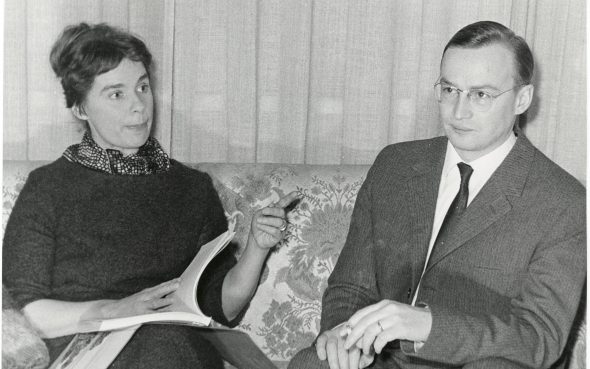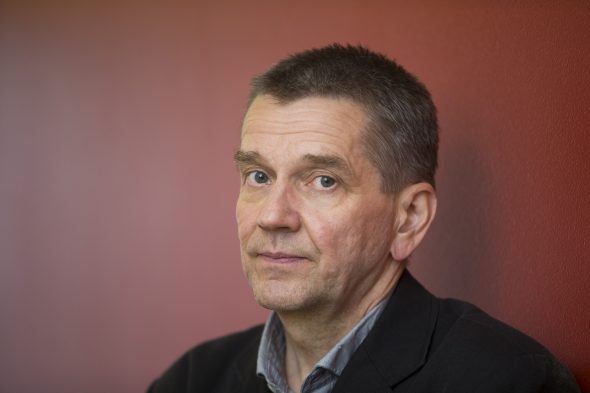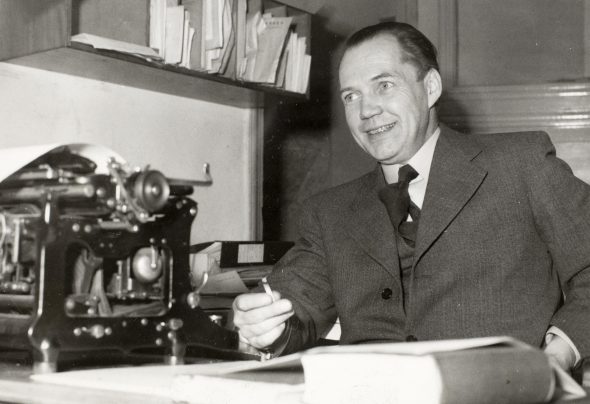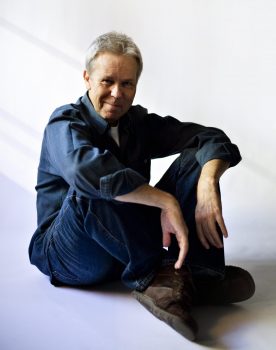Interviews
The Writer’s dilemma
Issue 2/1984 | Archives online, Authors, Interviews

Poets Marja-Liisa Vartio and Paavo Haavikko. Photo: SKS archives
Philip Binham interviews Paavo Haavikko
I think it’s impossible to be just a writer. That would mean isolating oneself completely from the outside world – so it’s important to have other work.
The appointment is on 5 April 1984 in Paavo Haavikko’s city office. Clearly a newly-inhabited office – he recently left his post as Literary Editor for the Otava Publishing Company to become a literary consultant under the letterhead of Arthouse Ltd. A desk jumbled high with papers and photos on which my tape recorder perches precariously; Haavikko is currently working on a history of a leading Finnish industrial enterprise, Wärtsilä. Typewriters, a phone, a few odd chairs, a secretary. Haavikko himself is business-like: well-cut grey suit, well-trimmed greying hair and beard, neat dark-blue tie: When I play the recording over, our voices echo oddly in the bare, high-ceilinged rooms.
PB: May I start by asking you something about your reading?
PH: That’s a very difficult question for me because up to now I’ve had two jobs – as a writer and a publisher, so my own reading has been more or less non-existent. Writing has taken up all my leisure time. And I thought, now that I’m not in the publishing business any more I’d have time for such reading – but so far I haven’t had any, so that seems to be something for the future. More…
Chill climates
Issue 2/1984 | Archives online, Authors, Interviews

Olli Jalonen. Photo: Pekka Nieminen.
Olli Jalonen was born in 1954 and lives in Hämeenlinna. His first work, a collection of short stories entitled Unien tausta (‘The background of dreams’, 1978) and two later novels, Sulkaturkki (‘Feather coat’, 1979) and Ilo ja häpeä (‘Joy and shame’, 1981) were reviewed with exceptional warmth by the critics. His latest novel, Hotelli eläville (‘Hotel for the living’, 1983) brought him a State Prize for Literature in 1984. The awarding committee commented that the novel is ‘a representative of that rare genre in Finnish literature, the grotesque novel’. Jalonen also received the ‘Spurs of Criticism’, the annual prize awarded by the Finnish Critics’ Association. The hotel for the living is the book’s ironic name for a nuclear shelter that is being quarried into the living rock of Finland; Jalonen sets up a situation that allows him to examine the crevices of his characters’ personalities. He studies their attitudes to life with cool satire – they live in the bleak climate of buying and selling, the struggle for power and material goods, the domination of others, and submission to their fates. Interview by Markku Huotari
‘Poetry in a world under threat’ was the headline for a survey of Finnish poetry by poet and critic Väinö Kirstina that appeared in the Tampere daily newspaper Aamulehti in 1981.
Two years later that headline is just as bitingly relevant. Only one alteration is necessary: to poetry must be added prose, for prose, too, is addressing itself to that future, difficult enough to imagine, in which the threat of nuclear war may involve Finland, living in the shadow of the super powers, in a conflict in which she wishes no part.
One of the scenes in Olli Jalonen’s novel Hotelli eläville (‘Hotel for the living’) is set in a nuclear shelter that is being built inside the living rock on which Helsinki stands. Even now the planners of that ‘shelter’ use the fear of other people to their own ends, and divide them into those who will be saved and those who will perish.
A sermon on the day of judgement? Cliche? Milking of a fashionable subject? More…
Ethics and the individual
Issue 1/1984 | Archives online, Authors, Interviews

Walentin Chorell. Photo: SLS
Over one hundred stage and radio plays, twenty six novels, poetry – the extent of Walentin Chorell’s work, from the early 1940s to his death last November was huge. The Finland-Swedish writer was by profession a teacher of psychology; his writing sprang from a real need to analyze the psychological drama of human life, to study other people – and at the same time himself – through the medium of literature.
His last television play, Hyena, is to be shown in Finland this summer, and his last radio play, Utopia, is to be broadcast in the spring. Many of his radio plays have been translated into the other Nordic languages, and his works have been performed and published in more than twenty countries.
The 71-year old writer was interviewed by Glyn Jones in Helsinki two months before his death.
‘I would say that writing for radio is what gives me most satisfaction, for there no limits are placed on your imagination. There are no limits in either time or space. On the radio you can have one scene portraying your main character as a child, and in the next as an adult; you can quickly follow that main character from childhood to adulthood, and your listeners will believe in it. As for space, you can set one scene in Paris – and indicate this by making a hotel porter call out the number of a room in French – and the following one can be set in Stockholm or Helsinki, and you can do it so convincingly that your listeners will believe in it.’ More…
They believe in Father Christmas
Issue 4/1982 | Archives online, Authors, Interviews

Mauri Kunnas. Photo: Otava / Katja Lösönen
Mauri Kunnas, 32, says he believes in Father Christmas more than ever before. His wife Tarja agrees; she and her husband work together in their studio in Turku on the illustrated children’s books that have won them fame in Finland and abroad. It is easy to believe the truth of the young artists’ protestations: the success of their book Joulupukki, or Santa Claus, must have seemed like a gift from Father Christmas. It appeared in the early autumn of 1981 and was taken to the Frankfurt Book Fair by its publishers, Otava, where it attracted more attention than any Finnish book had done previously. Rights immediately went to ten countries, from Japan to Canada, and four more contracts have since been concluded. Arto Seppälä intervews Mauri and Tarja Kunnas
Mauri Kunnas says he has drawn all his life. He intended to study law, but his sister persuaded him to go to art school instead. Towards the end of his course, short of money, Kunnas began to draw a strip cartoon for a Helsinki evening paper. He progressed to cartoons – but at present his plans for new books keep him too busy to contemplate anything else.
Mauri Kunnas’s first book was Suomalainen tonttukirja (‘The book of Finnish fairies’, 1979). ‘I never thought I would write children’s books until the fairy idea came into my head,’ he says. ‘At that time I was unhappily employed in an advertising agency, and life wasn’t living up to my expectations. I wanted to splash out, try something new. The fairy idea came to me as the result of a chance conversation about the Finnish world of faerie – elves, gnomes, guardian spirits and so on. More…
Interview with Kerttu-Kaarina Suosalmi
Issue 2/1980 | Archives online, Authors, Interviews
In these days of seminars, conferences, discussions and panels, Kerttu-Kaarina Suosalmi is in constant demand as a fluent and lively speaker on a variety of subjects. Whether the occasion is a gathering of young theologians, a pacifist rally on Independence Day, or a seminar for young Marxists, what she has to say is always both shrewd and stimulating. Her manner of speaking suggests not so much a radio announcer as a force of nature. Not that Kerttu-Kaarina Suosalmi is ‘a writer with a message’ in the accepted sense. She does not indulge in polemics; her novels are neither documentary nor autobiographical, but pure works of the imagination. Critics speak of her recent books as artistic triumphs. Nevertheless, the relevance of her work to present-day conditions and problems is strongly felt by the reading public. It is rare for such an abundance and variety of material to be combined with such qualities as spontaneity of form and excellence of expression. Suosalmi’s first book appeared as long ago as 1948, a collection of poems entitled Melanmitta (‘A stroke of the paddle’). Her early works in prose, Synti (‘The sin’, 1957), a collection of short stories, and the novel Neitsyt (‘The virgin’, 1964) were tightly constructed, ‘well-made’ works in the accepted Finnish tradition. A more personal style of writing made its appearance with Hyvin toimeentulevat ihmiset (‘These affluent people’, 1969). In this novel, constructionally speaking, Suosalmi breaks new ground: there is no consecutive plot, the book being built up of sections written from the points of view of the various ‘affluent people’ of the title, the thematic unity becoming evident only in the context of the entire novel. More…
-
Currently browsing
Interviews with Finnish authors and introductions to their work
-
RSS feed
Subscribe to RSS feed for Interviews
-
List of authors and contributors
- Abu-Hanna, Umayya
- Ågren, Gösta
- Aho, Hannu
- Aho, Juhani
- Aho, Claire & Westö, Kjell
- Ahola, Suvi
- Ahti, Risto
- Ahtola-Moorhouse, Leena
- Ahvenjärvi, Juhani
- Ala-Harja, Riikka
- Alftan, Maija
- Alhoniemi, Pirkko
- Anderson, John
- Andersson, Claes
- Andersson, Jan-Erik
- Andtbacka, Ralf
- Anhava, Tuomas
- Antas, Maria
- Apunen, Matti
- Aro, Tuuve
- Aronpuro, Kari
- Autio, Milla
- Bargum, Johan
- Bargum, Marianne
- Barrett, David
- Binham, Philip
- Björling, Gunnar
- Blau DuPlessis, Rachel
- Bolgár, Mirja
- Boucht, Birgitta
- Bremer, Caj
- Bremer, Stefan
- Brotherus, Elina & Ala-Harja, Riikka
- Byggmästar, Eva-Stina
- Canth, Minna
- Carlson, Kristina
- Carpelan, Bo
- Chan, Stephen
- Chorell, Walentin
- Diktonius, Elmer
- Ekman, Michel
- Ekroos, Anna-Leena
- Enckell, Agneta
- Enckell, Martin
- Enqvist, Kari
- Envall, Markku
- Eskola, Kanerva
- Fagerholm, Monika
- Flint, Austin
- Forsblom, Harry
- Forsblom, Sabine
- Forsström, Tua
- Gothóni, Maris
- Granö, Veli
- Gripenberg, Catharina
- Gröndahl, Satu
- Grünthal, Satu
- Haanpää, Pentti
- Haapala, Vesa
- Haasjoki, Pauliina
- Haatanen, Kalle
- Haavikko, Paavo
- Hämäläinen, Helvi
- Hämäläinen, Timo
- Hännikäinen, Timo
- Hänninen, Anne
- Hannula, Risto
- Harju, Timo
- Härkönen, Leena
- Harmaja, Saima
- Hassinen, Pirjo
- Havukainen, Aino & Toivonen, Sami
- Hawkins, Hildi
- Heikkilä-Halttunen, Päivi
- Heikkonen, Olli
- Heinimäki, Jaakko
- Hejkalová, Markéta
- Hellaakoski, Aaro
- Hertzberg, Fredrik
- Hiidenheimo, Silja
- Hiltunen, Eija Irene
- Hökkä, Tuula
- Holappa, Pentti
- Hollo, Anselm
- Holmström, Johanna
- Honkala, Juha
- Hotakainen, Kari
- Huldén, Lars
- Huotari, Markku
- Huotarinen, Vilja-Tuulia
- Huovi, Hannele
- Huovinen, Veikko
- Hurme, Juha
- Hyry, Antti
- Idström, Annika
- Ingström, Pia
- Inkala, Jouni
- Isomäki, Risto
- Istanmäki, Sisko
- Itkonen, Jukka
- Jalonen, Olli
- Jama, Olavi
- Jansson, Tove
- Järnefelt, Arvid
- Järvelä, Jari
- Järvinen, Outi
- Jeremiah, Emily
- Joenpelto, Eeva
- Joenpolvi, Martti
- Joensuu, Matti Yrjänä
- Jokela, Markus
- Jokinen, Heikki
- Jokisalo, Ulla & Kortelainen, Anna
- Jones, W. Glyn
- Jotuni, Maria
- Juntunen, Tuomas
- Juvonen, Helvi
- Kähkönen, Sirpa
- Kaila, Tiina
- Kaipainen, Anu
- Kanto, Anneli
- Kantokorpi, Mervi
- Kantokorpi, Otso
- Kantola, Janna
- Karlström, Sanna
- Karonen, Vesa
- Katajavuori, Riina
- Katz, Daniel
- Kihlman, Christer
- Kiiskinen, Jyrki
- Kilpi, Eeva
- Kilpi, Volter
- Kinnunen, Aarne
- Kirstinä, Leena
- Kirstinä, Väinö
- Kirves, Jenni
- Kivi, Aleksis
- Knapas, Rainer
- Kokko, Karri
- Kokko, Hanna & Bargum, Katja
- Kontio, Tomi
- Korhonen, Riku
- Korsström, Tuva
- Koskela, Lasse
- Koskelainen, Jukka
- Koskimies, Satu
- Koskinen, Sinikka
- Krohn, Leena
- Kulmala, Teppo
- Kunnas, Kirsi
- Kupiainen, Teemu & Bremer, Stefan
- Kurkijärvi, Gene
- Kuusisto, Stephen
- Kylätasku, Jussi
- Kyrö, Tuomas
- Kytöhonka, Arto
- Laaksonen, Heli
- Lahtela, Markku
- Lahti, Leena
- Laine, Jarkko
- Laitinen, Kai
- Lander, Leena
- Lassila, Pertti
- Laurén, Anna-Lena
- Leche, Johan & Grysselius, Johan
- Lehtola, Erkka
- Lehtola, Jyrki
- Lehtonen, Joel
- Lehtonen, Soila
- Leka, Kaisa
- Lesser, Rika
- Liehu, Rakel
- Liksom, Rosa
- Lilius, Carl-Gustav
- Lindberg, Petter
- Lindblad, Kjell
- Lindgren, Minna
- Lindgren, Minna & Löytty, Olli
- Lindén, Zinaida
- Linna, Väinö
- Lintunen, Maritta
- Liukkonen, Leena
- Liukkonen, Tero
- Lomas, Herbert
- London, Mindele
- Lounela, Pekka
- Löytty, Olli
- Lundberg, Ulla-Lena
- Luntiala, Hannu
- Lydecken, Arvid
- Määttänen, Markus
- Mäkelä, Hannu
- Mäkinen, Raine
- Malkamäki, Sari
- Manner, Eeva-Liisa
- Mannerkorpi, Juha
- Manninen, Teemu
- Marttila, Hannu
- Marttila, Mervi
- Mauriala, Vesa
- Mazzarella, Merete
- McDuff, David
- Mehto, Katri
- Melleri, Arto
- Meri, Veijo
- Meriluoto, Aila
- Metsähonkala, Mikko
- Mickwitz, Peter
- Mikkola, Marja-Leena
- Mikkonen, Sari
- Mörö, Mari
- Musturi, Tommi
- Neovius Deschner, Margareta
- Nevala, Maria-Liisa
- Nevanlinna, Arne
- Nevanlinna, Tuomas
- Niemi, Irmeli
- Niemi, Juhani
- Nieminen, Kai
- Nieminen, Pertti
- Nissilä, Anna-Leena
- Nordell, Harri
- Nordgren, Ralf
- Nummi, Jyrki
- Nummi, Lassi
- Nummi, Markus
- Oja, Vesa
- Oksanen, Aulikki
- Oksanen, Kimmo
- Olsson, Hagar
- Onerva, L
- Onkeli, Kreetta
- Orlov, Janina
- Otonkoski, Lauri
- Paasilinna, Arto
- Paasilinna, Erno
- Pääskynen, Markku
- Paasonen, Markku
- Paasonen, Ranya
- Päätalo, Kalle
- Paavolainen, Nina
- Pakkala, Teuvo
- Paksuniemi, Petteri
- Palmgren, Reidar
- Papinniemi, Jarmo
- Parland, Henry
- Parras, Tytti
- Parvela, Timo
- Pekkanen, Toivo
- Peltonen, Juhani
- Pennanen, Eila
- Petäjä, Jukka
- Petterson, Viktor
- Pettersson, Joel
- Peura, Annukka
- Peura, Maria
- Pimenoff, Veronica
- Pirilä, Marja
- Pohjola-Skarp, Riitta
- Polkunen, Mirjam
- Pulkkinen, Matti
- Pyysalo, Joni
- Raevaara, Tiina
- Raittila, Hannu
- Rajala, Panu
- Rane, Irja
- Rapo, Jukka & Rotko, Lauri, Jukka
- Rasa, Risto
- Rekola, Mirkka
- Riikonen, H.K.
- Rimminen, Mikko & Salokorpi, Kyösti
- Ringbom, Henrika
- Ringell, Susanne
- Rintala, Paavo
- Roine, Raul
- Roinila, Tarja
- Rönkä, Matti
- Rönnholm, Bror
- Rossi, Matti
- Runeberg, Fredrika
- Runeberg, Johan Ludvig
- Ruohonen, Laura
- Ruuth, Alpo
- Saarikangas, Kirsi
- Saarikoski, Pentti
- Saarikoski, Saska
- Saaritsa, Pentti
- Sahlberg, Asko
- Saint-Germain, Claire
- Saisio, Pirkko
- Salama, Hannu
- Sallamaa, Kari
- Salmela, Aki
- Salmela, Alexandra
- Salmenniemi, Harry
- Salminen, Arto
- Salminiitty, Satu
- Salo, Merja
- Sammallahti, Pentti & Thrane, Finn
- Sandelin, Peter
- Sandman Lilius, Irmelin
- Säntti, Maria
- Sariola, Esa
- Sarkia, Kaarlo
- Saurama, Matti
- Savolainen, Mikko
- Saxell, Jani
- Schatz, Roman & Jarla, Pertti
- Schildt, Runar
- Schoolfield, George C.
- Seppälä, Arto
- Seppälä, Juha
- Siekkinen, Raija
- Sihvo, Hannes
- Sihvonen, Lauri
- Sillanpää, Frans Emil
- Sillanpää, Johanna
- Simonsuuri, Kirsti
- Sinervo, Helena
- Sinisalo, Johanna
- Sirola, Jouko
- Sironen, Esa
- Skiftesvik, Joni
- Snellman, Anja
- Snickars, Ann-Christine
- Södergran, Edith
- Söderling, Trygve
- Statovci, Pajtim
- Stenberg, Eira
- Strandén, Tiia
- Sund, Lars
- Suosalmi, Kerttu-Kaarina
- Susi, Heimo
- Susiluoto, Saila
- Svedberg, Ingmar
- Tähtinen, Tero
- Tahvanainen, Sanna
- Takala, Riikka
- Tamminen, Petri
- Tapio, Juha K.
- Tapola, Katri
- Tapola, Katri & Talvitie, Virpi
- Tarkka, Pekka
- Taskinen, Satu
- Tate, Joan
- Tavi, Henriikka
- Tervo, Jari
- The Editors
- Thölix, Birger
- Tietäväinen, Ville
- Tiihonen, Ilpo
- Tikka, Eeva
- Tikkanen, Henrik
- Tikkanen, Märta
- Tirkkonen, Sinikka
- Toivio, Miia
- Topelius, Zachris
- Tossavainen, Jouni
- Tuomi, Panu
- Tuominen, Maila-Katriina
- Tuominen, Mirjam
- Turkka, Jouko
- Turkka, Sirkka
- Turtiainen, Arvo
- Turunen, Heikki
- Tuuri, Antti
- Tynni, Aale
- Tyyri, Jouko
- Urbom, Ruth
- Uschanov, Tommi
- Utrio, Kaari
- Vainio, Väinö
- Vainonen, Jyrki
- Väisänen, Hannu
- Vakkuri, Juha
- Vala, Katri
- Valkeapää, Nils-Aslak
- Valkonen, Kaija
- Valoaalto, Kaarina
- Valtaoja, Esko
- Vartio, Marja-Liisa
- Venho, Johanna
- Verronen, Maarit
- Viikari, Auli
- Viita, Lauri
- Virkkunen, Juha
- Virolainen, Merja
- Virtanen, Arto
- Vuoristo, Sari
- Wahlström, Erik
- Waltari, Mika
- Warburton, Thomas
- Westerberg, Caj
- Westö, Kjell
- Westö, Mårten
- Widén, Gustaf
- Willamo, Heikki
- Willner, Sven
- Witesman, Owen
- Zilliacus, Clas
- von Koskull, Agneta
- von Schoultz, Solveig
-
Yearly archive
© Writers and translators. Anyone wishing to make use of material published on this website should apply to the Editors.
